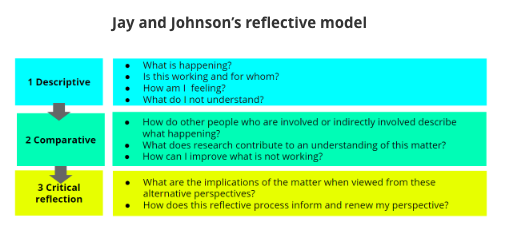My reflections will be based on the following reflective model by Jay & Johnson (2002)
Atawhaitia te pā harakeke
The inquiry topics I have chosen is based on the current work I am currently involved in.
The following are my two potential inquiry topics I am continuing to work on with a group of colleagues and kaiako. I am keen to embed the aspirations of the whakataukī to nurture and sustain the pā harakeke which could represent the Community of Practice within each of my inquiry topics. I am one of 6 workshop facilitators who are assisting and coaching a group Maori medium teachers to improve reo a waha proficiency in rūmaki reo settings,including the introduction of 21st century skills and ICT tools to support reo a waha interventions.
Inquiry Topics:
 1. How will selected ICT tools and 21st century skills enhance and promote reo a waha/reo kōrero for ākonga? (Tour Builder, Trello, Blogging)
1. How will selected ICT tools and 21st century skills enhance and promote reo a waha/reo kōrero for ākonga? (Tour Builder, Trello, Blogging)
2. How will a Community of Practice contribute to enhancing teaching and learning?
What is a Community of Practice?
- Groups of people who share a concern, a set of problems, or a passion about a topic, and who deepen their knowledge and expertise in this area by interaction on an ongoing basis (Wenger, MacDermott & Snyder, 2002.p.4).
Community - mutual engagement
Practice- shared repertoire
1. DESCRIPTIVE: I have recorded some the reflective thoughts and ideas in the table below
What is happening?
|
How is this working and for whom?
|
How am I feeling?
|
What do I ponder about?
|
·
Shared commitment, shared interest– reo a waha development
Tōku reo tōku ohooho my language is imy awakening,
Aromatawai
reo a waha
ICT Tools-Tour Builder, Trello, Blogging
Cooperative
learning strategies
Blended Learning Approach – rotation model
Blogging
|
Expression of Interest to identified kura – funding secured for
cluster schools.
PLD workshops & coaching of kaiako-Shared planning, delivery and
follow up
Term 3 – ICT/Blended Learning – Rotation model approach for Kaiako @ PLD
Technical/set up- small group/collaborative support
|
Excited
Motivated
Enthusiastic
Privileged
Humbled
Focussed
Apprehensive
|
More in-depth theory about
reo a waha proficiency progressions
- what does this look like?
-How do we know?
-What are the challenges
-Osmosis approach Vs targeted instruction
How do I accommodate for teacher readiness/
conditions for readiness
for technology
innovation – SAMR/TPAK;
Zhao et al; Growth mindset
strategies,
How familiar are kaiako
with 21st century skills?
How do we sustain teacher interest/motivation/
confidence for blogging?
Check in/visits/paired work.
Hanuscin, et al (2014).
|
2. COMPARATIVE- How do other people who are involved or indirectly involved describe what is happening? How does research contribute to an understanding of this matter?
Here are some of the whakaaro at this time and may change over time.
CoP
Group
|
Relevance
|
Contribution
|
Relevant Research
|
· Maori RTLB
· RTM
· Kaiako
· Puna Wānanga kaiako
|
Tōku reo tōku ohooho my language is my awakening
National Priority
MoE priority
Tātaiako
TPS
ICT Tools
|
Time
Resources
Wānanga/Reflection
Innovation – tools, strategies.
|
·
Tū Rangatira
·
Rukuhia, Rarangahia.
·
Kaiaka Reo
·
Te Piko o te Mahuri
·
Tātaiako
·
TMoA
|
3. CRITICAL REFLECTION - What are implications of the matter when viewed from these alternative perspectives? How does this reflection process inform and renew my perspective?
In this third dimension of the reflective process, "one makes a judgement or a choice among actions or simply integrates what one has discovered into a new and better understanding of he problem"
(Jay & Johnson, 2002. p.79)
What could possibly go wrong?
- Kaiako withdraw, disinterested.
- Disagreement/dissension occurs within the CoP
- Rushed - lack of focus & readiness of kaiako
- Skill and experiences of facilitators/kaiako
- Poor planning and limited research based evidence
- ICT Tools not seen as relevant and contributing to teaching and learning.
How does this reflective process inform and renew my perspective?
- Has sharpened my focus, planning and preparation
- Needing to work more collaboratively and consider the viewpoints of others.
REFERENCES
Diehl, E. (2013). Leading Change with a Growth Mindset. Community.mindsetworks.com.
Retrieved from http://community.mindsetworks.com/blog-page/home-blogs/entry/leading-change-with-a-growth-mindset
Hanuscin, D., Cheng, Y.,
Rebello, C., Sinha, S., & Muslu, N. (2014). The Affordances of Blogging as
a Practice to Support Ninth-Grade Science Teachers' Identity Development as
Leaders. Journal of Teacher Education, 65(3), 207-222. http://dx.doi.org/10.1177/0022487113519475
Jay, J.K. and Johnson,
K.L. (2002). Capturing complexity: a typology of reflective practice for
teacher education. Teaching
and Teacher Education, 18, 73-85.
Jurasaite-Harbison, E.,
& Rex, L. (2010). School Cultures as Contexts for Informal Teacher
Learning. Teaching and Teacher Education, 26(2), 267-277.
Knox, B. (2009,
December 4). Cultivating
Communities of Practice: Making Them Grow. [video file]. Retrieved
from https://www.youtube.com/watch?v=lhMPRZnRFkk
Wenger-Trayner, E.,
& Wenger-Trayner, B. (2015). Introduction to communities of practice: A
brief overview of the concept and its uses. Retrieved fromhttp://wenger-trayner.com/introduction-to-communities-of-practice/
Wenger, E. (1999). Communities of practice: Learning, meaning, and identity.
(Learning in doing). Cambridge: Cambridge University Press.
Yang, S., H. (2009).
Using blogs to enhance critical reflection and community of practice. Educational Technology &
Society, 12(2), 11-21.
Zhao, Y., Pugh, K.,
Sheldon, S. & Byers, J. (2002). Conditions for classroom technology
innovations. Teachers
College Record, 104(3), 482-515. Retrieved from https://www.rtsd.org/cms/lib/PA01000218/Centricity/Domain/96/Conditions%20for%20Classroom%20Tech.pdf







I enjoyed reading your post. I loved how you have used images to share understanding. You have put a great deal of thought into your research and reflection. I am excited to see the final outcome and hope you are successful indevising a digial tool that is easy to use for our akonga so they can all share in the learning speaking of te reo. I too am having to reach wider with my CoP, to seek viewpoints on others thinking. Good luck
ReplyDelete